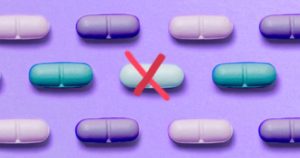Viral or bacterial? Does it matter?
Sick is sick, right? An infection is an infection. So why does it matter if it’s viral or bacterial?
It matters a lot. The way to treat the infection is very different. But we know for many of us, it comes down to antibiotics.
We grew up hearing antibiotics are the answer – to everything. But, that’s not the case.
What’s the difference?
Before understanding when an antibiotic will and won’t work, you have to understand the main differences between a virus and bacteria.
Viruses
A virus needs the living cells of a host. They attach to a cell, hijack its inner workings, and essentially reprogram it to multiply. The common cold, bronchitis, flu and HIV/AIDS are a few of the illnesses caused by viruses you often hear about.
Bacteria
Bacteria on the other hand are alive, with their own life process to replicate. And truth be told, not all bacteria are bad. In fact, of the different kinds, less than 1% are actually harmful. Most bacteria can be good, helping to digest food or fighting off disease.
But there are bacteria that cause illness. Lab tests, symptoms, and the length of illness are considerations that can help determine if it’s a bacterial or viral infection.
When antibiotics work, and when they don't
Antibiotics are designed to keep bacteria from creating a cell wall and multiplying. They attack the wall, stopping the reproduction of cells. Antibiotics also block protein production, which bacteria need to thrive.
So for certain infections like bacterial sinus infections, bladder infections and strep throat, antibiotics work well to eliminate existing cells and stop the infection from spreading.
Antibiotics won’t work on a viral infection, like the common cold or flu. The virus, or cells that caused the illness, are different than bacteria, so antibiotics don’t have any way of stopping them from multiplying.
Prescribing antibiotics for viral infections is ineffective at best and increasingly irresponsible at its worst. As the understanding of antibiotics grows, the goal is to prescribe antibiotics appropriately, lessening the risk of antibiotic resistance.
No antibiotic - now what?
If you’ve been diagnosed with a viral infection, your immune system is truly the best cure. The human body has an amazing army of cells that collectively come to the aid of your health when under attack by a virus.
"
When it comes to treating viral infections, it’s all about managing your symptoms for maximum comfort, allowing your immune system to do what it does best.
That doesn’t mean you shouldn’t take recommended medications or give your body the rest it deserves. These steps, along with plenty of fluids, support the healing process and help your body recover. Most people have the capacity to fight off many infections and will usually feel better in 3 to 10 days.
Symptoms over two weeks may indicate there’s a bacterial infection, or that something else is going on. So if you're the type to wait out your illnesses just be careful you’re not ignoring concerning or long-lasting symptoms.
According to the CDC, antibiotic resistance is one of the most urgent threats to the public’s health. Although waiting can sometimes make you feel powerless against an annoying virus, there are many things that can be done to relieve symptoms almost immediately.

